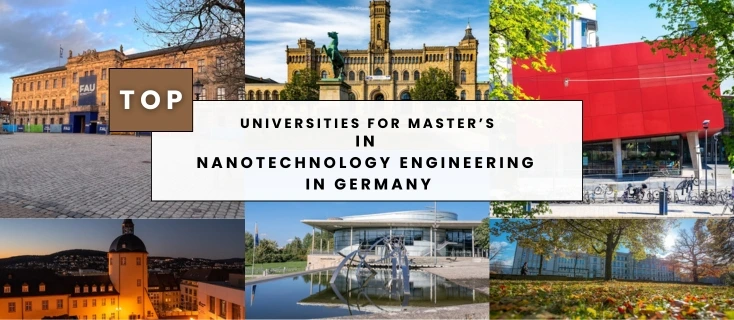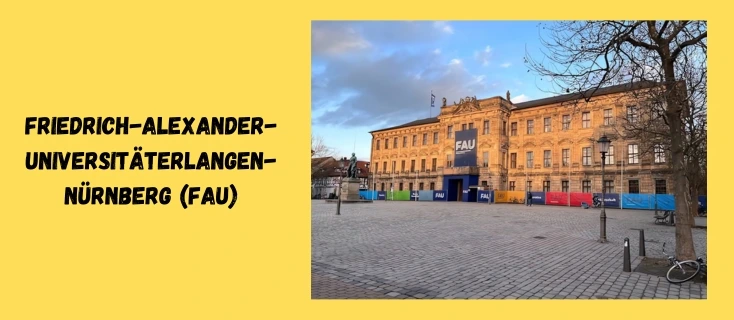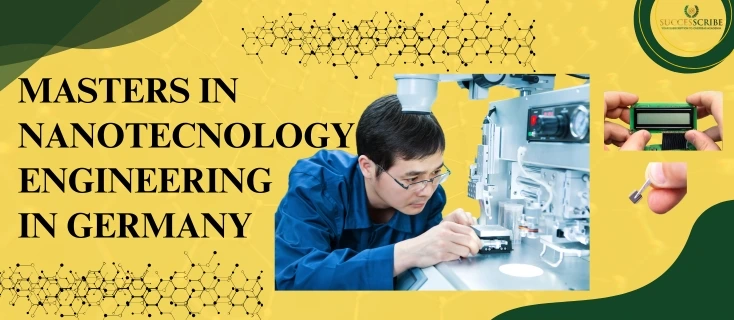Nanotechnology is transforming industries worldwide, from medicine to electronics. Germany, the powerhouse of innovation and research, ranks among the top five countries globally for nanotechnology patents. With over 40 billion euros invested annually in research and development, Germany offers unparalleled opportunities for aspiring nanotechnology engineers. A Masters in Nanotechnology Engineering in Germany combines cutting-edge education, advanced facilities, and industry collaboration, making it one of the most sought-after programs for students looking to pioneer advancements at the molecular and atomic levels. In this topic of Masters in Nanotechnology Engineering in Germany, we are going to cover all the important aspects of the topic.
Why Choose Germany for Master’s in Nanotechnology Engineering in Germany
Here are some of the prominent reasons why someone should choose Germany for pursuing their Master’s Degree in Nanotechnology
- Germany ranks in the top 5 globally for nanotechnology patents and allocates over €40 billion annually for research and development.
- With over 1,000 companies specializing in nanotechnology, Germany is at the forefront of industrial applications, contributing significantly to global advancements.
- Most public universities charge zero or no tuition fees, making quality education accessible and affordable.
- The demand for nanotechnology experts is rising across sectors such as healthcare, electronics, and renewable energy, with starting salaries ranging from €50,000 to €90,000 per year.
- Germany hosts over 400,000 international students annually, fostering a diverse and enriching learning experience.
- International Student-Friendly, Germany hosts over 400,000 international students each year, supported by English-taught programs and post-study work visa options.
- Germany invests heavily in green technologies, providing opportunities for nanotechnology applications in renewable energy and environmental solutions.
Admission Requirements
There are some admission requirements if you’re planning to pursue Masters in Nanotechnology Engineering in Germany:
- Educational Qualification: A Bachelor’s or German Diplom degree with at least 210 credit points (ECTS) in a relevant field such as Nanotechnology, Material Science, Physics, Chemistry, or Mechanical Engineering.
- Grade Requirements: A minimum grade point average (GPA) of 2.5 or equivalent on a German scale.
- Language Proficiency:
| For English-taught programs: | IELTS (minimum 6.5) or TOEFL (minimum 90) |
| For German-taught programs | TestDaF (minimum TDN 4) or Goethe Certificate minimum B2 |
- Standardized Tests: GRE or GATE scores may be required by some universities.
- Supporting Documents:
- Statement of Purpose (SOP) outlining academic background, motivation, and career aspirations.
- 3 – 4 letters of recommendation from academic or professional referees.
- A detailed CV/resume showcasing educational qualifications, work experience, internships, and achievements.
- Work Experience: While not mandatory, prior work or internship experience in nanotechnology or related fields is advantageous.
- APS Certificate
- German Visa
Top 5 Universities for Nanotechnology Engineering in Germany

Here are the top universities for Masters in Nanotechnology Engineering in Germany. Here is the universities requirement and other important information:
1. FAU (Friedrich-Alexander-Universität Erlangen-Nürnberg)

FAU is one of Germany’s largest universities, renowned for its cutting-edge research and innovation, particularly in the fields of nanotechnology, materials science, and engineering. The university’s research centers focus on nanomaterials, nanorobotics, and the development of nanostructured devices that can revolutionize various industries, including electronics and healthcare.
| Requirement | Details |
| Program Name | MSc Nanotechnology |
| Language Proficiency Test | IELTS – 6.5 / TOEFL – 90 |
| Academic Qualification | Bachelor’s degree with a minimum 75% score |
| Other Documents | Statement of Purpose (SOP), CV, 2-3 LORs, APS Certificate |
2. Ilmenau University of Technology

Ilmenau’s nano-engineering programs emphasize nano-sensors and nano-optics, equipping students with the knowledge to address challenges in nanoelectronics and renewable energy technologies.
| Requirement | Details |
| Program Name | Master of Science in Micro- and Nanotechnologies |
| Language Proficiency Test | IELTS – 6.5 / TOEFL – 85 |
| Academic Qualification | Bachelor’s with 75% in a related field |
| Other Documents | APS Certificate, SOP, LORs, Transcripts |
3. Chemnitz University of Technology

Chemnitz University focuses on interdisciplinary research, particularly in digital transformation and nanotechnology. The university specializes in nanomaterials, nanoelectronics, and biomolecular engineering, aiming to develop nanoscale devices for medical applications and environmental sustainability.
| Requirement | Details |
| Program Name | Masters in Micro and Nano Systems |
| Language Proficiency Test | IELTS – 6.5 / TOEFL – 90 |
| Academic Qualification | Bachelor’s with at least 70% aggregate |
| Other Documents | Motivation Letter, CV, SOP, APS |
4. University of Siegen

A mid-sized university that prioritizes innovation, the University of Siegen is celebrated for its quality education and student support. The University of Siegen is a leader in applied nanotechnology, with a strong focus on nano-fabrication techniques for clean energy solutions and medical devices.
| Requirement | Details |
| Program Name | MSc. Nanoscience and Nanotechnology |
| Language Proficiency Test | IELTS – 6.5 / TOEFL – 90 |
| Academic Qualification | Bachelor’s with a minimum score of 72% |
| Other Documents | SOP, Academic Transcripts |
5. Munich University of Applied Sciences (HM)

One of the largest universities of applied sciences in Germany, HM is known for its focus on practical education and industry connections. HM’s industry connections provide opportunities for students to work on real-world applications of nano-technologies in industries ranging from pharmaceuticals to clean energy solutions.
| Requirement | Details |
| Program Name | Master’s in Micro- and Nanotechnology |
| Language Proficiency Test | IELTS – 6.5 / TOEFL – 88 |
| Academic Qualification | Bachelor’s with at least 70% |
| Other Documents | SOP, LORs, CV |
6. Leibniz University Hannover

With its strong emphasis on technical sciences, Leibniz University Hannover is renowned for fostering a vibrant research environment.
| Requirement | Details |
| Program Name | Master of Science Nanotechnology |
| Language Proficiency Test | IELTS – 6.0 / TOEFL – 80 |
| Academic Qualification | Relevant Bachelor’s degree with 70% or above |
| Other Documents | Letter of Recommendation (LOR), SOP, APS, Academic Transcripts |
7. Dresden University of Technology (TU Dresden)

TU Dresden is one of Germany’s elite universities, renowned for its research in nanotechnology and materials science. The university’s focus on nanophotonics, nanoelectronics, and nanosensors plays a key role in the development of smart materials and nanostructured devices.
| Requirement | Details |
| Program Name | MSc Physics of Life |
| Language Proficiency Test | IELTS – 7.0 / TOEFL – 95 |
| Academic Qualification | Bachelor’s with a minimum of 75% |
| Other Documents | SOP, Letters of Recommendation, APS Certificate, Academic Transcripts |
Cost of Studying Nanotechnology Engineering in Germany
Here is the estimated cost of studying while studying in Germany:
| Expense | Estimated Cost (per year) |
| Tuition Fees (Public Universities) | €0 – €1,500 |
| Tuition Fees (Private Universities) | €10,000 – €20,000 |
| Living Expenses | €10,000 – €12,000 |
| Health Insurance | €1,200 |
| Semester Contribution | €150 – €300 |
| Miscellaneous | €2,000 |
Course Structure and Specializations
The Master’s in Nanotechnology Engineering generally follows a course structure lasting two years, it is constituted into four semesters. In different universities, the components of such a degree may vary, but on the whole, they usually include these three aspects:
1. Core Courses
- Nanomaterials and Nanocomposites
- Nanofabrication and Characterization Techniques
- Quantum Mechanics for Nanotechnology
- Nanodevices and Nanorobotics
- Nanoelectronics and Nanophotonics
2. Elective Courses
- Nanobiotechnology and Medical Nanotechnology
- Nanomaterials for Energy Applications
- Nanostructures and Thin Films
- Computational Nanotechnology
3. Research Project and Thesis
In the final semesters, students work on a research project in collaboration with faculty or industry partners. The culmination of the program is a Master’s thesis, where students apply the knowledge gained throughout the course to a real-world problem in the field of nanotechnology.
Career Prospects after Masters in Nanotechnology Engineering in Germany
Graduates with a Masters Degree in Nanotechnology Engineering in Germany can pursue careers in various industries. Here are some potential job roles and their average annual salaries in Germany:
| Job Roles | Role | Industry | Average Annual Salary (€) |
| Nanotechnology Research Scientist | Researching nanoscale materials, developing innovative nanotechnology applications | Research & Development | €65,000 – €90,000 |
| Material Engineer | Designing and improving materials at the molecular level for use in electronics, aerospace, or healthcare | Advanced Materials & Manufacturing | €60,000 – €85,000 |
| Nanoelectronics Engineer | Developing nanoscale electronic components for devices and systems | Semiconductor & Electronics | €55,000 – €80,000 |
| Biomedical Nanotechnology Specialist | Creating nanodevices and systems for drug delivery, diagnostics, and regenerative medicine | Healthcare & Biotechnology | €60,000 – €88,000 |
| Process Engineer | Optimizing production processes involving nanomaterials or nanoscale fabrication | Semiconductor & Manufacturing | €55,000 – €75,000 |
| Quantum Computing Engineer | Working on nanoscale components for quantum computing systems | IT & Computing | €70,000 – €100,000 |
| Energy Storage Researcher | Designing nanostructured materials for more efficient energy storage solutions like batteries and supercapacitors | Renewable Energy & Batteries | €60,000 – €85,000 |
| Photonics Engineer | Working on nanophotonic devices, including LEDs, lasers, and optical sensors | Optoelectronics & Communications | €60,000 – €85,000 |
| Nanomanufacturing Engineer | Developing scalable manufacturing processes for nanotechnology products. | Industrial Manufacturing | €58,000 – €80,000 |
The Growing Importance of Nanotechnology
Nanotechnology is transforming the world by revolutionizing industries by enabling the production of new materials and devices whose properties were unthinkable before. This ranges from medicine to energy storage and environmental sustainability. The ability to manipulate materials at the nanoscale, smaller than the width of a human hair, enables scientists and engineers to create products that are more efficient, durable, and capable of performing tasks that traditional materials cannot. With the demand for professionals in nanotechnology growing rapidly, Germany with its state-of-the-art research facilities and strong industrial base, is an ideal destination for advanced education in this field.
1. Nanotechnology in Medicine

One of the most exciting applications of nanotechnology is in the medical field, especially in drug delivery, diagnostics, and medical devices. Nanoparticles can be engineered to deliver drugs directly to cancer cells or other target tissues in the body, minimizing side effects and improving treatment outcomes. In addition, nanotechnology allows for the development of highly sensitive diagnostic tools that can detect diseases at much earlier stages than conventional methods. This holds huge potential for nanotechnology-based breakthroughs in the medical field and offers a well-developed biotechnology and pharmaceutical industry in Germany that provides opportunities for graduates with nanotechnology skills.
2. Nanotechnology in Energy

While the world seeks ways to become greener, sustainable energy solutions need the support of nanotechnology for enhanced efficiency of energy storage devices, such as batteries and supercapacitors. Nanomaterials are used for the development of better solar panels, wind turbines, and other renewable energy technologies to improve efficiency and reduce the cost. Another application of nanotechnology is seen in energy-harvesting devices that capture waste energy from the environment. It is one of the critical points for the solving of global energy challenges, making Germany an excellent destination for students interested in nanotechnology and its further development.
3. Nanotechnology in Environmental Protection

Nanotechnology can aid in solving various environmental problems, water purification, air pollution, and waste. Nanomaterials are great at filtering contaminating substances out of water and air. It is possible to break down polluting substances by nanocatalysts, and nanomembranes will remove heavy metals and toxins from the environment. As global environmental challenges increase, nanotechnology-based solutions for fighting pollution and sustainability will definitely see growing demand in coming times. With environmental sustainability and green technology, Germany has enough career opportunities for nanotechnology engineers.
Scholarships for International Students Pursuing Masters in Nanotechnology Engineering in Germany
Germany offers a wide range of scholarships for international students who wish to pursue higher education, including programs like a Master’s in Nanotechnology Engineering. Here are some of the Scholarships Name that you can avail of:
- DAAD Master’s Degree Scholarship
- Erasmus Mundus Scholarships
- Heinrich Böll Foundation Scholarships
- Konrad Adenauer Foundation Scholarships
- Friedrich Ebert Foundation Scholarships
- Deutschland Stipendium
Conclusion
A Masters in Nanotechnology Engineering in Germany offers an excellent opportunity for students to gain specialized knowledge in one of the most exciting and innovative fields of science and engineering. With world-class universities, strong research opportunities, and close industry ties, Germany provides a conducive environment for students to grow academically and professionally.
Graduates of nanotechnology engineering programs in Germany can expect a wide range of career opportunities in industries such as electronics, biotechnology, energy, and environmental protection, with competitive salaries and the potential to make groundbreaking contributions to technology and society.
FAQs
What is the average salary for a Nanotechnology Engineer in Germany?
The average salary for a nanotechnology engineer in Germany ranges from €55,000 to €90,000 annually, depending on the role, industry, and experience.
How can I fund my studies in Germany?
Germany is known for affordable education, the tuition fees in the public universities is around 350 euros per semester. Although you can explore various funding options like scholarships, student loans, and part-time work opportunities. Scholarships like the DAAD Master’s Degree Scholarship and Erasmus Mundus can help reduce the financial burden.
What is the scope of a Master’s in Nanotechnology?
A Master’s in Nanotechnology offers vast opportunities in healthcare, electronics, energy, and environmental sectors. Graduates can work in developing medical devices, nanoelectronics, energy-efficient materials, and environmental solutions. With growing demand for nanotech applications, there are excellent career prospects in research, industry, and innovation with competitive salaries and career growth.
What is the cost of living in Germany for international students?
The estimated cost of living for an international student in Germany is around €10,000 to €12,000 per year. This includes accommodation, food, transport, and other personal expenses.
What are the top universities offering Master’s in Nanotechnology Engineering in Germany?
Some of the top universities for Nanotechnology Engineering in Germany include:
1. FAU (Friedrich-Alexander-Universität Erlangen-Nürnberg)
2. Ilmenau University of Technology
3. Chemnitz University of Technology
4. University of Siegen
5. Munich University of Applied Sciences (HM)
6. Leibniz University Hannover
7. Dresden University of Technology (TU Dresden)
Relate Post
Agricultural Engineering in Germany
Mechatronics Engineering in Germany
Healthcare Management in Germany
Chemical Engineering in Germany













